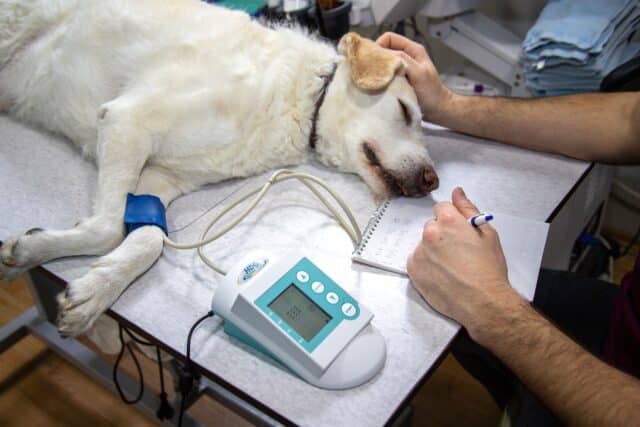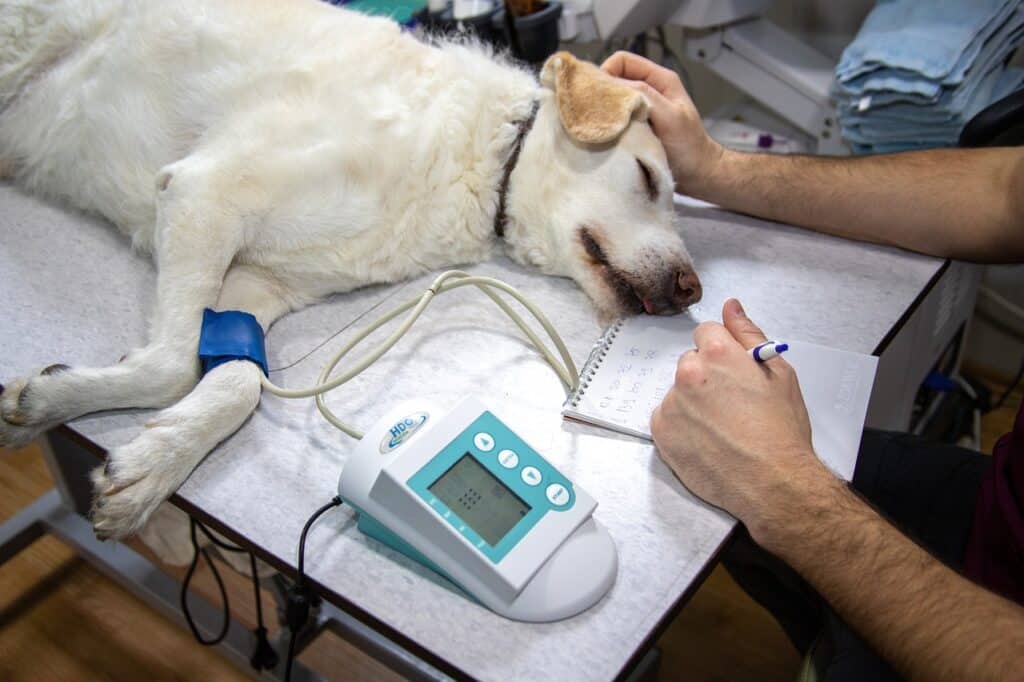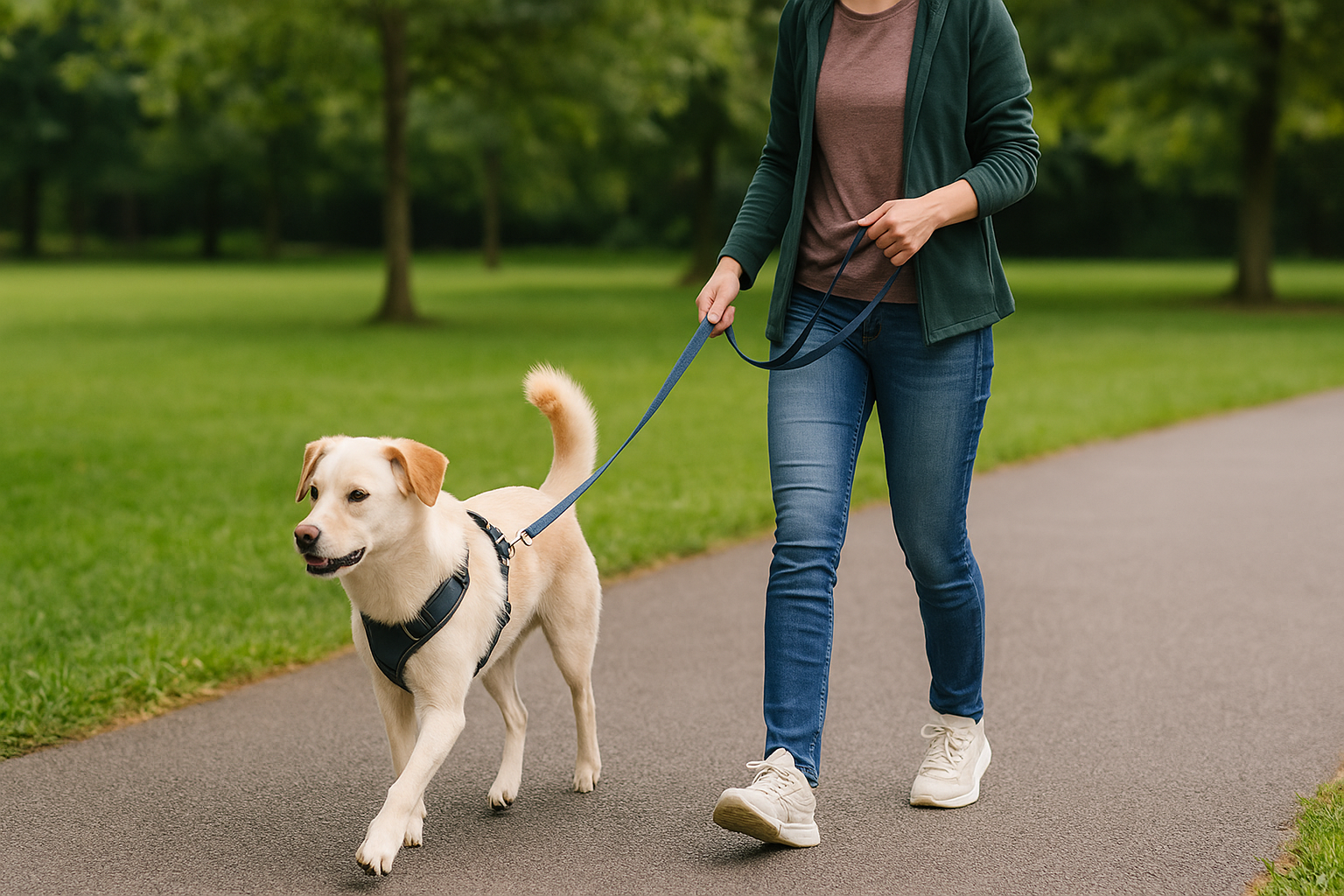
Common Health Issues in Senior Dogs
To tackle common health issues in senior dogs, this article offers insights into arthritis and joint pain, dental problems, cognitive dysfunction syndrome, cancer, and incontinence. Each sub-section highlights a different health concern that your senior dog might face, and the appropriate treatments to ensure their well-being.
Arthritis and Joint Pain
As your furry friend gets older, they may develop health issues. Arthritis or joint pain is one of them. It’s caused by inflammation and stiffness in the joints, making things like walking, running, and jumping difficult. The risk is higher in large breeds and those with joint injuries.
To prevent the condition, watch your pup’s diet and exercise levels. Treatment includes prescription medication and nutritional supplements. Physical therapy, massage, and acupuncture can also be used to improve movement.
If your pup has any signs of pain, schedule an appointment with the vet immediately. This will help your pup stay active for longer. Looks like it’s time for more than just a dental cleaning!
Dental Problems
Senior dogs need good oral hygiene to stay healthy. Not caring for their teeth can lead to serious issues, like periodontal disease and tooth loss. Keeping up with their dental health is essential to ensuring they have a happy life until the end.
Painful dental issues stop older dogs from eating and drinking. Plaque and tartar on the teeth cause gum inflammation and gingivitis. Bacteria in the mouth can even affect other body parts like the heart and kidneys.
Brush your senior dog’s teeth often and take them for a vet cleaning every six months. Dental chews and regular check-ups help. Starting good oral hygiene habits early can prevent problems and reduce existing ones.
Good oral hygiene includes a healthy diet, regular brushing, and yearly vet visits. Dental chews, water additives, and toys designed for dental health all help keep a senior dog healthy.
Good oral hygiene not only helps physical health, but also reduces pain from sore gums or bad teeth. Caring for a senior dog’s teeth can add healthy years to their life.
Cognitive Dysfunction Syndrome
Age-related cognitive decline in dogs, also known as Canine Cognitive Dysfunction (CCD), is an awful neurodegenerative disorder. It affects senior dogs and their owners by causing memory loss, confusion, and changes in behavior.
Symptoms of CCD include:
- Decreased activity level
- Disorientation
- Vocalization at night
- Anxiety or restlessness
- Elimination accidents inside the house
- Decreased responsiveness to commands
These signs can be caused by beta-amyloid protein buildup in the brain.
Vet-approved medication and supplements are available to manage CCD and improve cognitive function. Plus, exercising routinely can delay age-related cognitive decline.
Pro Tip: Early detection and intervention can greatly help senior dogs with cognitive dysfunction. Regular vet check-ups can catch problems before they worsen. So, cherish your pup – cancer is never a friend!
Cancer
As dogs grow older, they become more prone to ailments. Senescence-related proliferative disorders are common in senior canines. These are caused by damage to cellular pathways, leading to uncontrolled cell division and tumors.
Certain breeds are more at risk of developing such disorders. Unfortunately, there is no definite cure. But early detection and treatment can help extend the dog’s life.
Therefore, owners should carefully monitor their senior dogs for lumps. A vet can biopsy these to determine the diagnosis.
Incontinence
Forgettin’ to poop or pee? It’s a common problem in aging canines called ‘Canine Incontinence.’
It can appear in several forms and cause serious health issues if not addressed.
Causes could be a bladder infection, hormone imbalance, weak sphincter muscles, nerve damage, or cognitive dysfunction.
Signs like urinating when sleepin’ or resting, lickin’ the genital area, or lack of control over bowel movements or peein’ can spot it.
Treatments like medication for bladder regulation, hormone replacement therapy, and physiotherapy can help.
Plus, pet owners should provide toileting areas, absorbent materials, and maintain healthy weight and fur. Surgery may be needed in certain cases.
Other subtle signs overlooked by pet owners can also be present. It could be behavioral or environmental factors, so monitor closely.
Veterinarian advice is necessary as soon as signs are spotted. Diagnosis and treatment can manage this problem and remove stress from the pet and owner.
Treatments for Common Health Issues
To tackle common health issues in senior dogs, here’s a guide to treatments you can give them. Ease their arthritis and joint pain with medications, keep their dental health in check with cleaning and surgery, treat Cognitive Dysfunction Syndrome with medication and supplements, fight cancer with chemotherapy, radiation, and surgery, and help them with incontinence with medication or surgery.
Medications for Arthritis and Joint Pain
My grandpa suffered from joint pain due to arthritis. His doctor prescribed medications to help relieve his symptoms.
NSAIDs like aspirin and ibuprofen reduce pain and inflammation. Corticosteroids can be taken in pill, injection, or topical form. DMARDs slow the progression, and biological response modifiers target specific causes of inflammation. Acetaminophen helps with pain, but not inflammation.
To manage joint pain and arthritis, individuals should consult a healthcare professional to determine the right medication for them. Healthy habits like maintaining weight, eating a balanced diet, exercising, and quitting smoking are also essential.
Holistic Approaches for Senior Dog Health
To improve your senior dog’s well-being holistically, turn to acupuncture and chiropractic care, massage and physical therapy, as well as diet and nutrition solutions. These methods will help tackle the common health issues experienced by senior dogs and improve their quality of life.
Acupuncture and Chiropractic Care
Senior dogs can benefit from complementary therapies like acupuncture and chiropractic care. These non-invasive approaches focus on restoring balance in the body and improving their overall well-being.
Acupuncture involves inserting fine needles into specific points. This stimulates natural healing processes and releases tension. Meanwhile, chiropractic care uses manual adjustments to realign joints. This helps to alleviate pain and improve mobility.
These holistic therapies can be an excellent alternative or addition to traditional veterinary treatments. Especially for senior dogs with chronic pain or age-related conditions. Licensed practitioners can provide safe, effective care for your pet.
Consider adding acupuncture or chiropractic care to your senior dog’s healthcare routine. This can help them feel their best as they age and improve their quality of life. Don’t miss out on these beneficial options!
Massage and Physical Therapy
Optimizing Senior Dog’s Physical Health
Ensuring holistic senior dog health is key. A comprehensive approach is needed, including massage and physical therapy. All stages of a dog’s life require physical activity. Senior dogs need special consideration to maintain mobility and flexibility. Vets can recommend exercises for the breed and age.
Senior dogs have different needs for exercise. Low-impact activities, like walking, on uneven surfaces, such as rocks or hiking trails, help balance and motor skills. Massage therapy can reduce pain or stiffness associated with age-related issues. It releases endorphins and promotes overall well-being.
Be careful with physical stimulation. Too intense or quickly may hurt instead of help. A balanced diet and adequate hydration should go with these activities.
Pro Tip: Blend massage therapy with low-impact exercises to improve your senior dog’s physical health. Old dogs can learn new tricks!
Diet and Nutrition
Senior dogs need to eat right for optimal health and longevity. Their diet should be high in protein and low in calories, with enough fiber to prevent constipation. Consider adding supplements recommended by your vet, such as glucosamine for joint health or omega-3 fatty acids for healthy skin and coat. Avoid feeding them table scraps or human food, as it can cause digestive issues.
Studies have shown that a proper diet can add up to two years of life expectancy compared to dogs fed calorie-dense diets that contribute to weight gain and related ailments. So it’s important to choose age-appropriate food for senior dogs.
If your senior dog is less interested in food, it may be due to dental or gastrointestinal issues. Breaking down meals into smaller portions throughout the day instead of three large meals can help stimulate their appetite.
Be a detective and keep an eye on their health. Look for signs of arthritis and bad breath – these could be signs of neglecting their nutritional needs, leading to bigger problems.
Monitoring Your Senior Dog’s Health
To monitor your senior dog’s health with regular vet check-ups, at-home health checks, and monitoring changes in behavior and appearance is necessary. Regular vet check-ups can help detect underlying health issues, while at-home health checks could help with the early detection of any medical conditions. Monitoring changes in behavior and appearance aid in determining whether a visit to the vet is necessary.
Regular Vet Check-Ups
Senior dogs need special care. Routine vet check-ups help keep them healthy. Appointments can catch health issues early. A vet can give advice on diet and exercise.
At a vet visit, the doc will check teeth, lungs, heart and joints. Plus, blood work and tests for health concerns. Regular check-ups can detect diseases in their early stages.
Developing a relationship with the vet is important. They need to know your dog’s history and needs. That way, they can quickly spot changes in behaviour or symptoms.
Prepare for the vet visit. Write down questions. Bring along medical records and docs on supplements or meds.
Who needs a vet? Play doctor at home – just don’t get caught using the thermometer!
At-Home Health Checks
As a pet parent, keeping track of your aging pup’s health is essential. At-home check-ups can keep your furry baby well. Here are ways to watch your senior dog’s health:
- Observe daily activities: Note energy levels, appetite, water intake, attitude, and behavior for any odd changes.
- Do regular body exams: Look for lumps, bumps, and any strange growth in skin or fur. Check ears and eyes for discharge and redness.
- Check vital signs: Note temperature, heart rate, and breathing rate – all good health indicators.
Be aware of other signs like trouble changing positions or reluctance to go up stairs. AVMA says 80% of dogs over age 3 have dental issues, so regular vet visits are important.
Stay alert with at-home checks, and talk to your vet if anything seems off! Senior dogs can’t speak but can show you what they need. Don’t expect them to give you a pen and paper, though!
Monitoring Changes in Behavior and Appearance
Keep an eye on your beloved pooch as they age. Changes in behavior, activity, and physical traits can tell you a lot about potential health issues. Notice alterations in sleep habits, appetite, or mood. Also, look out for any changes in how they interact with family or other pets – it could signal cognitive ailments like dementia or separation anxiety.
Your pup’s appearance could change too. Dull fur, lumps or bumps, cloudy eyes, or extreme weight gain or loss might indicate medical problems like arthritis, kidney disease, or thyroid imbalances.
Early detection is vital for successful treatment, so don’t forget routine vet visits and to be observant of any changes in your pup! Bella, a friend’s senior dog, stopped playing one day and was found to be losing her sight due to cataracts. Her vet restored much of her vision with surgery, and she was back to her happy self! Keep a hopeful outlook and be mindful of your senior dog’s health – it really is the best thing you can do.
Conclusion: Caring for Your Senior Dog’s Health with Proper Treatment and Monitoring.
As your dog ages, it’s important to provide the right care and watch them closely. Senior dogs are more prone to diseases, like arthritis, dental issues, obesity, and vision/hearing loss. Regular check-ups and a healthy diet can help prevent these health problems.
- Arthritis can be treated with medications or joint supplements such as glucosamine and chondroitin.
- Dental issues need professional cleaning and daily brushing.
- Exercise and a low-fat diet can help overweight senior dogs.
- Vision loss means less clutter and using scent markers for navigation.
Check for signs of discomfort or sickness, like changes in appetite, energy, movement, or behavior. Timely action can keep health problems from getting worse.
Make sure your senior pup stays healthy and happy by giving them enough exercise, a balanced diet, regular trips to the vet, vaccinations and heartworm protection, and interactive toys or training. Don’t wait – take action now to ensure your senior dog lives the best life possible with the right care and monitoring.
Frequently Asked Questions
Q: What are the common health issues in senior dogs?
A: The common health issues seen in senior dogs include arthritis, dental diseases, cancer, cognitive dysfunction, diabetes, and kidney diseases.
Q: How can I tell if my dog is in pain due to arthritis?
A: Some signs that your dog may be in pain due to arthritis include limping or favoring certain limbs, stiffness or difficulty getting up after lying down, reluctance to walk or climb stairs, and changes in behavior such as aggression or withdrawal.
Q: What are the treatment options available for arthritis in senior dogs?
A: Treatment options for arthritis in senior dogs include weight management, physical therapy, pain management medications, joint supplements, and surgery in severe cases.
Q: Is dental disease a serious health concern for senior dogs?
A: Yes, dental disease in senior dogs can lead to serious health concerns such as kidney disease, heart problems, and systemic infections.
Q: How can I prevent dental disease in my senior dog?
A: You can prevent dental disease in your senior dog by regularly brushing their teeth, providing dental chews and toys, and scheduling regular dental cleanings with your veterinarian.
Q: How can I ensure my senior dog stays healthy overall?
A: To ensure your senior dog stays healthy overall, you should schedule regular checkups with your veterinarian, maintain a healthy diet and weight, provide regular exercise and mental stimulation, and address any health concerns promptly.





Great work! Your post was very enlightening.
Excellent post! Looking forward to more of your content.